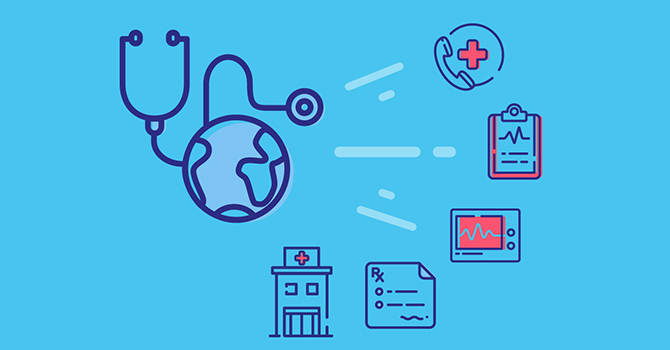Understanding the Role of Health Care RCM in Enhancing Monetary Performance and Patient Contentment
Navigating the intricacies of Healthcare Revenue Cycle Management (RCM) is essential for achieving optimal financial performance while at the same time raising individual satisfaction. RCM's ability to streamline billing, make certain specific coding, and accelerate insurance claims processing stands as a cornerstone of modern healthcare procedures. Nonetheless, the nuanced interplay between these components warrants a more detailed assessment to completely appreciate their effect on both healthcare companies and patients. As we discover the transformative capacity of RCM, inquiries about its calculated application and future advancements beckon, encouraging insights that could redefine sector criteria and individual experiences alike.

Key Elements of RCM
In the facility landscape of medical care, Income Cycle Management (RCM) is pivotal in ensuring economic stability and functional efficiency. Person registration and qualification verification are fundamental actions, guaranteeing that exact client info is captured and insurance protection is confirmed prior to services are provided.

Charge capture is an additional vital part, involving the precise recording of solutions offered to individuals. It ensures that all billable services are represented, consequently maximizing profits possibility. Concurrently, medical coding translates patient encounters right into standardized codes, which are critical for billing and regulative conformity.
Cases entry and management follow, involving the prep work and submission of cases to payers. This process requires careful interest to information to lessen errors and stop hold-ups. Rejection monitoring is a proactive approach to settle and resolve rejected insurance claims, guarding earnings streams.
Last but not least, settlement uploading and person collections complete the cycle, making certain settlements are properly videotaped and exceptional balances are pursued. With each other, these elements develop a robust structure that supports the operational and financial health of medical care organizations.
Influence On Financial Performance
Effective Profits Cycle Administration (RCM) substantially influences a health care organization's economic performance by maximizing capital and lowering profits leakage. RCM includes the comprehensive payment and collection procedures that guarantee doctor efficiently handle their monetary transactions from patient enrollment to final payment. By improving these processes, organizations can lessen refuted claims, expedite payment cycles, and boost overall economic health and wellness.
Financial efficiency is enhanced via precise monitoring of invoicing treatments, which involves precise coding and prompt submission of cases. This minimizes the possibility of case denials and denials, which can significantly impede revenue circulation otherwise dealt with quickly. In addition, incorporating advanced innovation solutions assists in real-time monitoring of claims and financial metrics, giving healthcare managers with the devices necessary to make educated critical decisions.

Enhancing Patient Satisfaction
While optimizing financial efficiency is a vital purpose of Earnings Cycle Monitoring (RCM), it additionally plays an essential function in improving client contentment. By decreasing administrative worries, RCM permits medical care providers to concentrate much more on client treatment, which directly improves patient satisfaction.

RCM additionally improves person fulfillment through efficient communication. By preserving a thorough database of person information, RCM promotes improved communication in between patients and healthcare providers, making sure people feel notified and valued.
Strategies for Effective RCM
Accomplishing reliable Profits Cycle Management (RCM) needs medical care companies to implement a set of calculated techniques that make sure economic stability and operational effectiveness. One essential strategy is the adoption of technology-driven services, such as incorporated software systems that enhance payment processes, reduce errors, and improve data accuracy. These systems allow real-time tracking of financial metrics, recommended you read permitting timely identification and rectification of ineffectiveness.
One more method is the standardization of procedures throughout the earnings cycle. Healthcare RCM. This entails creating regular plans for person registration, insurance policy confirmation, and declares processing. By making sure that all staff abide by these standards, organizations can minimize discrepancies and speed up settlement collections
Team training and growth likewise play an essential function in effective RCM. Trained employees can successfully browse complicated billing treatments and laws, boosting and minimizing denials capital. Routine updates on policy adjustments and ideal methods help maintain a educated and experienced workforce.
Future Trends in RCM
As health care companies improve their Earnings Cycle Administration (RCM) approaches with innovation and standard processes, focus is now transforming in the direction of the future patterns forming this vital location. One significant pattern is the assimilation of expert system (AI) and artificial intelligence to automate complex jobs, such as cases processing and predictive analytics. These modern technologies are expected to lower errors, speed up purchase times, and provide data-driven understandings for far better decision-making.
Additionally, the shift in the direction of value-based treatment continues to influence RCM methods - Healthcare RCM. Medical care carriers are expected to progressively concentrate on patient results and satisfaction, necessitating RCM systems that can fit brand-new repayment versions. This change will call for more thorough data collection and analysis to successfully determine and report on efficiency metrics
Interoperability is an additional arising top priority, as seamless data exchange in between diverse systems comes to be crucial. Boosted interoperability will promote more accurate patient information sharing, decreasing additional reading administrative concerns and improving the patient experience.
Verdict
Medical Care Profits Cycle Management (RCM) considerably affects both financial efficiency and client fulfillment by maximizing billing procedures, making certain exact coding, and enabling punctual claims entry. Effective RCM decreases income leak and accelerates money circulation, decreasing case rejections and expediting repayments.
Browsing the complexities of Medical care Revenue Cycle Administration (RCM) is essential for accomplishing ideal financial performance while simultaneously raising individual satisfaction. RCM includes the thorough billing and collection procedures that make sure healthcare carriers efficiently manage their economic deals from patient enrollment to final payment. By minimizing administrative concerns, RCM enables health care providers more to focus extra on person care, which directly improves client fulfillment.
By keeping a thorough data source of patient information, RCM helps with improved communication between patients and healthcare service providers, guaranteeing clients feel educated and valued.Health Care Income Cycle Management (RCM) considerably influences both financial efficiency and person satisfaction by maximizing payment procedures, making sure accurate coding, and allowing prompt claims submission.